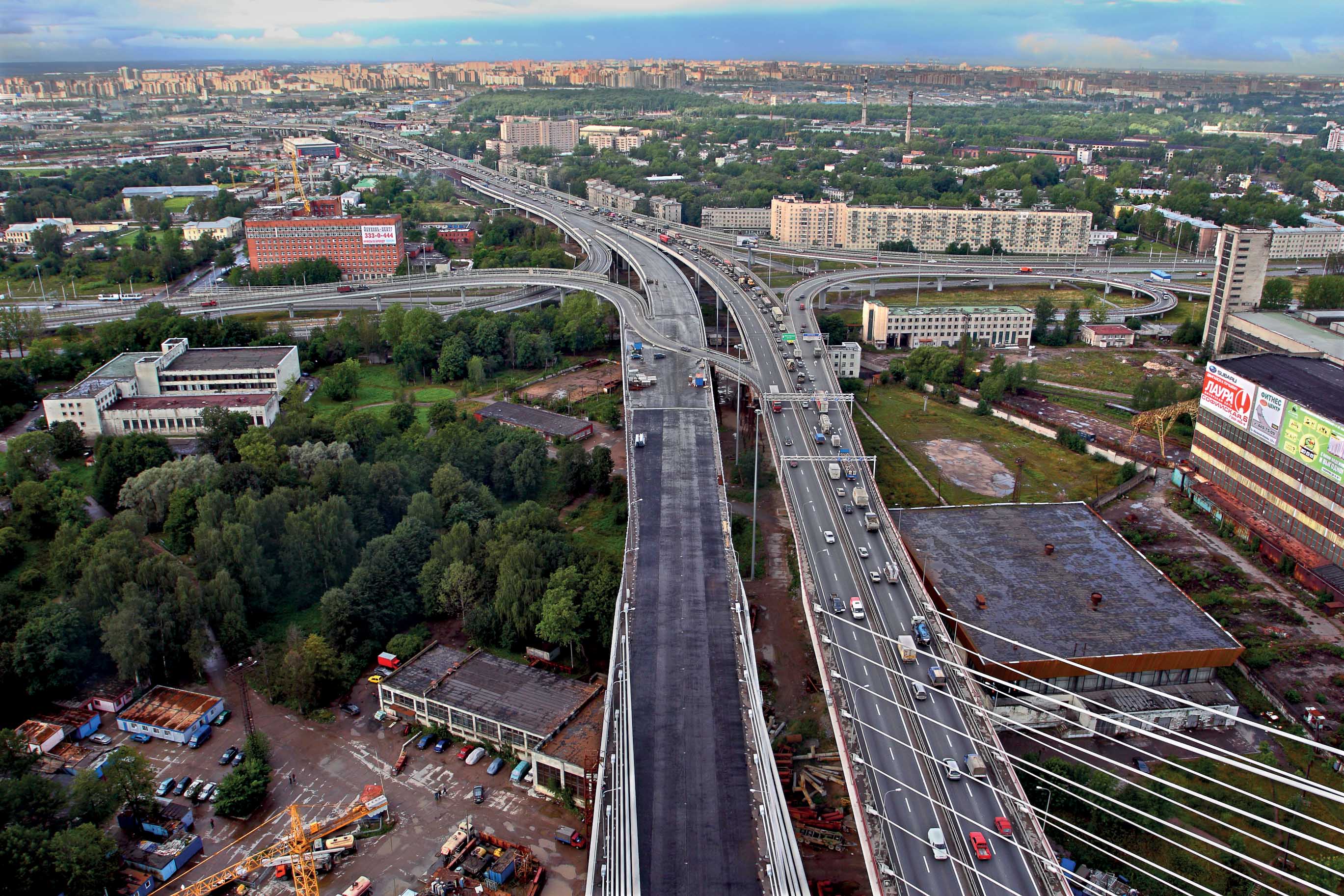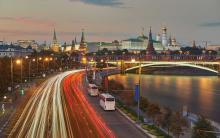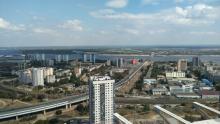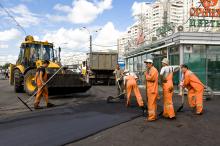Russia’s road building programme looks set to be cut due to economic issues - Eugene Gerden writes
The Russian Government is considering a significant cut to the existing road building programme for the current year. This is due to a current economic crisis in the country, caused by Western sanctions as well as a collapse in the price of oil and gas.

St Petersburg has benefited from new roads and bridges but its ring road still requires completion
Russia’s road building programme looks set to be cut due to economic issues - Eugene Gerden writes
The Russian Government is considering a significant cut to the existing road building programme for the current year. This is due to a current economic crisis in the country, caused by Western sanctions as well as a collapse in the price of oil and gas.
As part of this decision The Federal Road Transport Agency (7931 Rosavtodor), has already announced its plans to cut funding domestic road building by 28% this year. This will be equivalent to a cut of US$706.2 million (RUB 36.8 billion). Rosavtodor is the Russian Government agency responsible for overseeing the road transport industry and transport engineering in the country.
According to recent statements made by Roman Starovoit, head of Rosavtodor, the total volume of investments in the building and modernisation of federal roads in Russia in 2015 will amount to $1.76 billion (92 billion rubles), which is 28% less than the initial state plans, estimated at $2.46 billion (128 billion rubles).
At the same time however, despite the announced cuts, the Russian government plans to execute recent orders of Russia’s president Vladimir Putin in the field of road building. These involve doubling the volume of road construction in Russia by 2022 and ensuring the condition of 85% of the existing federal roads in Russia meet Western standards by 2020. At present only 52% of existing federal roads meet Western standards but by the end of the current year, this figure should reach 62%.
According to Gregory Prokuronov, deputy head of Rosavtodor, due to the current unfavourable business environment afflicting Russia, the government will mostly focus on the implementation of a second order from the president. For the programme of new roads, there is a possibility that implementation of the plans will be postponed to the 2023-2025 period.
Gregory Prokuronov SAID, “We decided to focus on the modernisation of existing roads this year. Otherwise, the rate of roads being damaged will overtake the rate of their construction."
At the same time, the list of projects for which funding will be cut has not yet been established. There is a possibility that one such project, implementation of which is expected to be suspended, involves the modernisation and expansion of the St Petersburg Ring Road. The 142km orbital freeway encircles the city and is currently its only orbital route.
After more than two decades of construction, the completed Ring Road was officially opened on August 12th, 2011. Since that time the route has helped to significantly improve the traffic situation within St Petersburg.
There is also a possibility that cuts may also affect further expansion of the Kholmogory Highway (Yaroslavl highway), which is a major trunk road that links Moscow to the Russian North and the Ural Mountains.
At the same time the launch of new projects will take place only in accordance with a personal decision of Russia’s deputy prime minister Arkady Dvorkovich. He controls the activities of the Ministry of Transport and the Federal Road Agency in the Russian Government.
According to Prokuronov, the building of other roads will continue, but will take place at significantly slower rates, compared to previous years.
However this will not mean that the projects will all be frozen. Last year around 580km of federal roads were built and reconstructed in Russia, which is significantly more the 534km initially planned. The volume of investments amounted to $8.066 billion (420 billion rubles).
According to initial state plans, about $10.94 billion (570 billion rubles) should be provided on the needs of road building for this year. This should be invested in the building and reconstruction of 781km of roads in the country.
In the meantime, the state plans that have been announced have already sparked criticism from some Russian analysts focusing on road building, as well as a number of top officials. Oleg Skvortsov, former deputy Minister of Transport of Russia and the President of the Association of Research Organisations in the field of road building, is particularly critical of the reduction of funding of the road building programme. He commented, "This is the wrong decision. The majority of countries prefer to invest in the development of infrastructure, and in particular road building during the times of crisis, while, in the case of Russia, a significant part of the industry’s projects will be frozen.”
Skvortsov has also added that such a decision may result in serious financial problems for some of the domestic road building companies. It could even force some companies out of this business area or out of the market altogether.
The situation for these road building companies is aggravated by the existing ban on the imports of high-tech Western technologies for road building to Russia, due to sanctions. Another problem comes from the increase of lease payments, which took place in recent months. This in turn, may result in massive lay-offs in the Russian road building industry.
At the same, according to recent statements of an official spokesman of Russia’s prime minister Dmitry Medvedev, the cuts will not affect the earlier announced state plans for the provision up to $1.338 billion (RUB 70 billion) of subsidies to Russian regions. The largest volume of these will be provided to the Moscow region. Because Moscow and the Moscow region are central to Russia’s economy as a whole, the majority of the planned projects will continue as they are considered of strategic importance by the Russian Government.
But unlike Moscow and the Moscow region, the current situation with road building in other parts of the country remains much more complex.
At present the majority of regions are experiencing a shortage of funds even for the maintenance of the existing road network. Data from the Russian Association of regional road administrations (RADOR) reveals that in 2014, only $3.673 billion (191.9 billion rubles) were allocated for the modernisation and maintenance of roads in Russian regions. RADOR is well placed to observe the market as it is the leading organisation for advocating, financing, planning and building of highways and roads in Russian regions and it says the sum is about one seventh of what was required.
According to plans announced earlier by the Russian Government, about $28.6 billion (1.5 trillion rubles) will be invested in road building in Russia by the end of 2018. But due to the current economic crisis in the country, there is a possibility that these plans will be revised.
According to analysts in the Russian Ministry of Industry and Trade, in addition to the current financial crisis in the country, another reason of the state’s decision to cut spending on road building is a significant increase of military costs in the Russian federal budget. These reached $63 billion (RUB 3.3 trillion) for 2015, a historical high for Russia and the USSR.
At the same time, according to Mikhail Blinkin, director of the Institute of Transport Economics of the Russian Higher School of Economics, the situation is further aggravated by a significant increase of the cost of road building in Russia. According to Blinkin, this became mainly due to the price increases for aggregates and other construction materials used in road building. He has also added that in the case of aggregates, the increase is a result of the sector’s reliance for production on imported technologies, the cost of which has significantly increased due to the devaluation of the ruble.
The Russian Government is considering a significant cut to the existing road building programme for the current year. This is due to a current economic crisis in the country, caused by Western sanctions as well as a collapse in the price of oil and gas.
As part of this decision The Federal Road Transport Agency (
According to recent statements made by Roman Starovoit, head of Rosavtodor, the total volume of investments in the building and modernisation of federal roads in Russia in 2015 will amount to $1.76 billion (92 billion rubles), which is 28% less than the initial state plans, estimated at $2.46 billion (128 billion rubles).
At the same time however, despite the announced cuts, the Russian government plans to execute recent orders of Russia’s president Vladimir Putin in the field of road building. These involve doubling the volume of road construction in Russia by 2022 and ensuring the condition of 85% of the existing federal roads in Russia meet Western standards by 2020. At present only 52% of existing federal roads meet Western standards but by the end of the current year, this figure should reach 62%.
According to Gregory Prokuronov, deputy head of Rosavtodor, due to the current unfavourable business environment afflicting Russia, the government will mostly focus on the implementation of a second order from the president. For the programme of new roads, there is a possibility that implementation of the plans will be postponed to the 2023-2025 period.
Gregory Prokuronov SAID, “We decided to focus on the modernisation of existing roads this year. Otherwise, the rate of roads being damaged will overtake the rate of their construction."
At the same time, the list of projects for which funding will be cut has not yet been established. There is a possibility that one such project, implementation of which is expected to be suspended, involves the modernisation and expansion of the St Petersburg Ring Road. The 142km orbital freeway encircles the city and is currently its only orbital route.
After more than two decades of construction, the completed Ring Road was officially opened on August 12th, 2011. Since that time the route has helped to significantly improve the traffic situation within St Petersburg.
There is also a possibility that cuts may also affect further expansion of the Kholmogory Highway (Yaroslavl highway), which is a major trunk road that links Moscow to the Russian North and the Ural Mountains.
At the same time the launch of new projects will take place only in accordance with a personal decision of Russia’s deputy prime minister Arkady Dvorkovich. He controls the activities of the Ministry of Transport and the Federal Road Agency in the Russian Government.
According to Prokuronov, the building of other roads will continue, but will take place at significantly slower rates, compared to previous years.
However this will not mean that the projects will all be frozen. Last year around 580km of federal roads were built and reconstructed in Russia, which is significantly more the 534km initially planned. The volume of investments amounted to $8.066 billion (420 billion rubles).
According to initial state plans, about $10.94 billion (570 billion rubles) should be provided on the needs of road building for this year. This should be invested in the building and reconstruction of 781km of roads in the country.
In the meantime, the state plans that have been announced have already sparked criticism from some Russian analysts focusing on road building, as well as a number of top officials. Oleg Skvortsov, former deputy Minister of Transport of Russia and the President of the Association of Research Organisations in the field of road building, is particularly critical of the reduction of funding of the road building programme. He commented, "This is the wrong decision. The majority of countries prefer to invest in the development of infrastructure, and in particular road building during the times of crisis, while, in the case of Russia, a significant part of the industry’s projects will be frozen.”
Skvortsov has also added that such a decision may result in serious financial problems for some of the domestic road building companies. It could even force some companies out of this business area or out of the market altogether.
The situation for these road building companies is aggravated by the existing ban on the imports of high-tech Western technologies for road building to Russia, due to sanctions. Another problem comes from the increase of lease payments, which took place in recent months. This in turn, may result in massive lay-offs in the Russian road building industry.
At the same, according to recent statements of an official spokesman of Russia’s prime minister Dmitry Medvedev, the cuts will not affect the earlier announced state plans for the provision up to $1.338 billion (RUB 70 billion) of subsidies to Russian regions. The largest volume of these will be provided to the Moscow region. Because Moscow and the Moscow region are central to Russia’s economy as a whole, the majority of the planned projects will continue as they are considered of strategic importance by the Russian Government.
But unlike Moscow and the Moscow region, the current situation with road building in other parts of the country remains much more complex.
At present the majority of regions are experiencing a shortage of funds even for the maintenance of the existing road network. Data from the Russian Association of regional road administrations (RADOR) reveals that in 2014, only $3.673 billion (191.9 billion rubles) were allocated for the modernisation and maintenance of roads in Russian regions. RADOR is well placed to observe the market as it is the leading organisation for advocating, financing, planning and building of highways and roads in Russian regions and it says the sum is about one seventh of what was required.
According to plans announced earlier by the Russian Government, about $28.6 billion (1.5 trillion rubles) will be invested in road building in Russia by the end of 2018. But due to the current economic crisis in the country, there is a possibility that these plans will be revised.
According to analysts in the Russian Ministry of Industry and Trade, in addition to the current financial crisis in the country, another reason of the state’s decision to cut spending on road building is a significant increase of military costs in the Russian federal budget. These reached $63 billion (RUB 3.3 trillion) for 2015, a historical high for Russia and the USSR.
At the same time, according to Mikhail Blinkin, director of the Institute of Transport Economics of the Russian Higher School of Economics, the situation is further aggravated by a significant increase of the cost of road building in Russia. According to Blinkin, this became mainly due to the price increases for aggregates and other construction materials used in road building. He has also added that in the case of aggregates, the increase is a result of the sector’s reliance for production on imported technologies, the cost of which has significantly increased due to the devaluation of the ruble.









